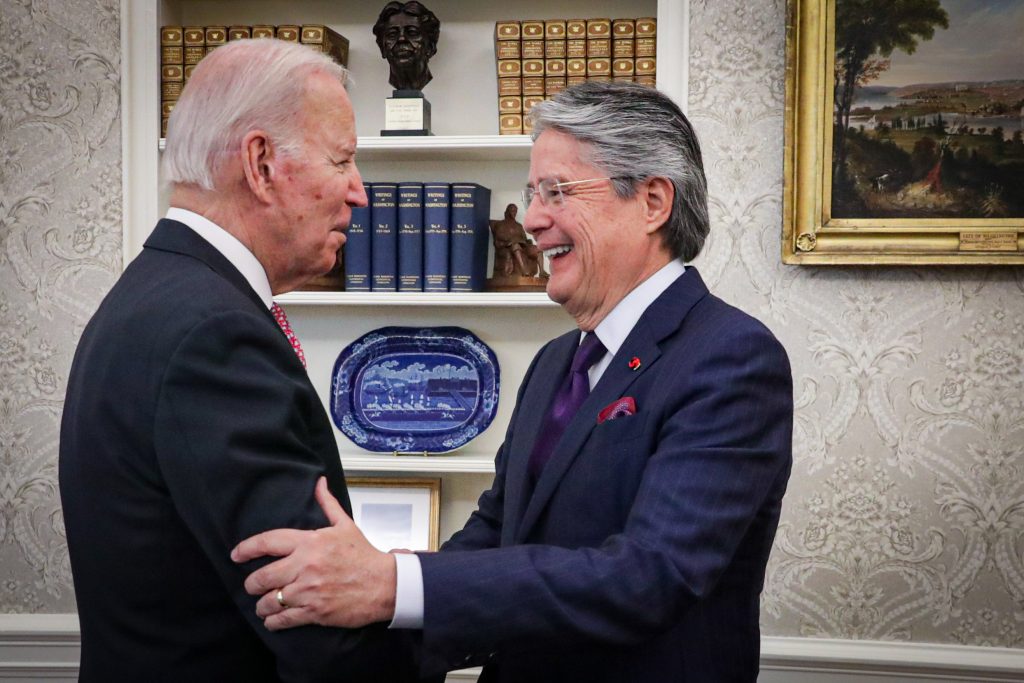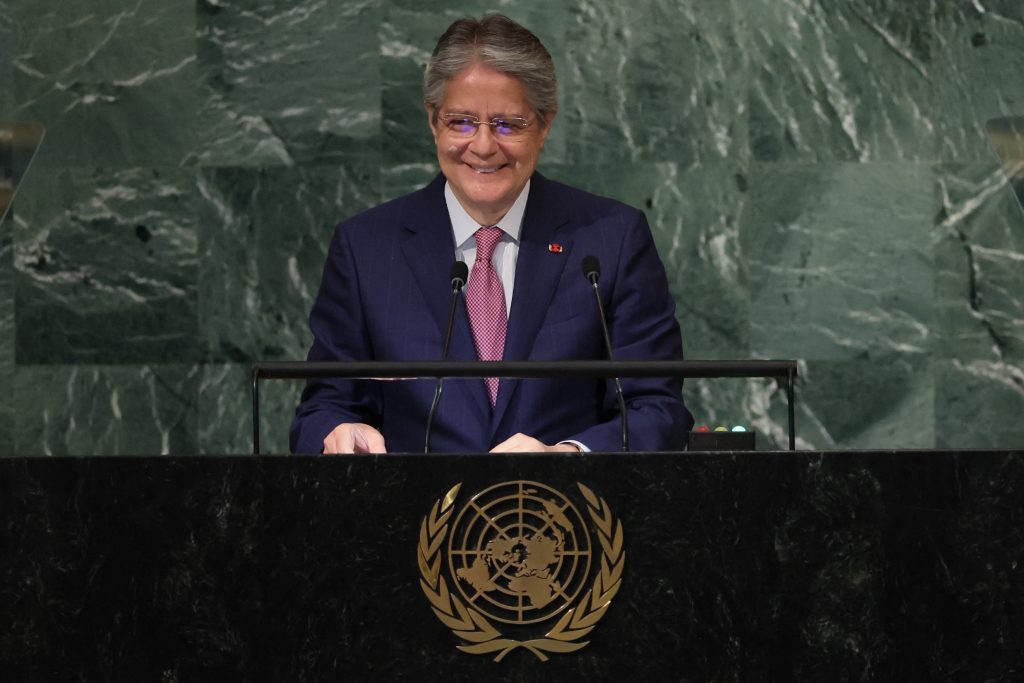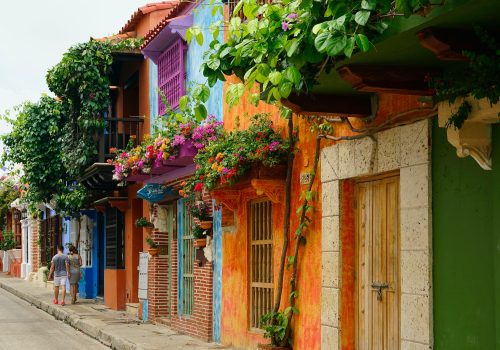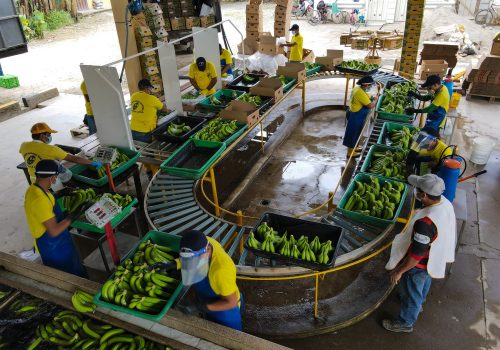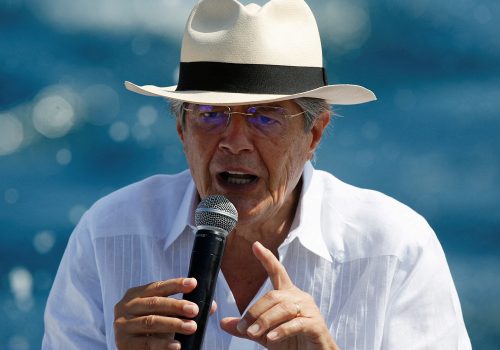Watch the full event
This week, Ecuadorian President Guillermo Lasso chose Washington—specifically, an event co-hosted by the Atlantic Council at the Inter-American Dialogue—to announce his plans to run for re-election in 2025. The announcement was part of his pitch, following meetings with US President Joe Biden and others, for newfound stability in a country that is finding its democratic footing. And he hinted that Washington could be a useful campaign ally.
“The Constitution of Ecuador allows re-election only once. For me that will be in 2025,” Lasso said on Tuesday. “Washington can certainly give a boost in confidence, and I can tell you that I am not going to shy away from that possibility.”
Here are some more highlights from Lasso’s conversation with Rebecca Bill Chavez, president and CEO of the Inter-American Dialogue:
Democracy on the agenda
- During his Washington trip, Lasso met with Biden, the US Agency for International Development, the Organization of American States, the World Bank, and the Inter-American Development Bank, coming away with nearly forty million dollars in commitments from the US government to support female entrepreneurs, fight child malnutrition, and protect the environment.
- Lasso said that he seeks to “continue working on economic matters with virtuous policies required by Ecuador, with more democracy and greater investment in social programs.”
- Following his triumph over President Lenin Moreno in April 2021, Lasso assured his audience that Ecuador has “fully returned to democracy.” He said his victory came against “a populist model characterized by penetrating power and then producing an implosion of democratic institutions.”
Economy on the rise
- Lasso said that in the past eighteen months his government has furthered a recovery for an economy that was in shambles, with a budget deficit of almost 7 percent of Ecuador’s gross domestic product (GDP) because of the COVID-19 pandemic. “We currently have a deficit of 3 percent [of GDP] that is expected to decrease even more in 2023. Fiscal deficits are a curse to the future of the nation, as it is debt that will eventually be assumed by our children and grandchildren. Our mission is to make sure that value is as low as possible.”
- Lasso touted how last week the International Monetary Fund (IMF) announced the successful completion of Ecuador’s twenty-seven-month program and authorized the final disbursement of seven hundred million dollars. It is the second time in twenty years that Ecuador has successfully completed an IMF program.
- The president also pointed out that Ecuador—which uses the US dollar as its currency—has the second lowest inflation in the Americas and the highest economic growth projection for 2023 in the region. Under his government, Lasso said, the economy “is in very good health.”
Security on the brink
- That economic success means Lasso’s main concern, as he put it, is “internal security.”
- He explained that the fight against drug trafficking “is not easy,” but he boasted of having seized three hundred tons of drugs, figures much higher than those of previous governments.
- Lasso noted that organized crime networks have responded to his aggressive enforcement with “violence in prisons and violence in the streets.” But he assured the audience that his government is working non-stop to confront the issue utilizing both the armed forces and the National Police.
Isabel Chiriboga is a project assistant at the Atlantic Council’s Adrienne Arsht Latin America Center and is originally from Quito, Ecuador.
Watch the full event
Further reading
Tue, Dec 20, 2022
What might be ahead for Latin America and the Caribbean in 2023? Take our ten-question poll and see how your answers stack up
Spotlight By
How will the region ride a new wave of changing economic and political dynamics? Will the region sizzle or fizzle? Join in and be a part of our ten-question poll on the future of LAC.
Mon, Dec 19, 2022
As China’s influence grows, Biden needs to supercharge trade with Ecuador
New Atlanticist By
Monday's White House meeting between Ecuadorian President Guillermo Lasso and US President Joe Biden is a golden opportunity to push mutually beneficial trade talks.
Thu, Mar 3, 2022
Ecuador is a test case for how the US can counter Beijing’s influence in Latin America
New Atlanticist By Gabriel Alvarado
Ecuador's dealings in China highlighted just how important it will be for the United States to nurture its ties with governments that have shown an interest in cooperating with Washington.
Image: Washington, United States.- In the photos taken on December 19, 2022, the President of Ecuador, Guillermo Lasso (right), met with his US counterpart, Joe Biden (left), as part of an official visit to the United States. One of the main objectives of the meeting between the leaders was to advance the possibility of signing a Free Trade Agreement, according to the press office of the Presidency of the Republic.
